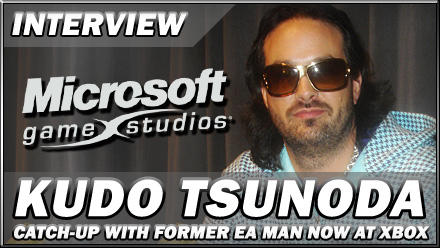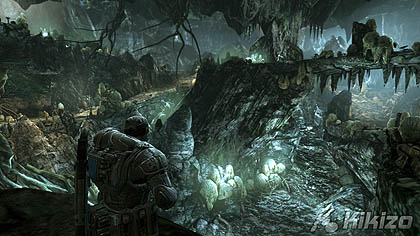Interview: Microsoft's Kudo Tsunoda
Read our quick catch up with former EA Chicago man now in the creative driving seat at Microsoft Game Studios.

There's no doubt about this man's passion for games. Fresh from a high profile creative warpath at EA, producing the likes of Fight Night, Kudo Tsunoda joined Microsoft Game Studios earlier this year to help shape Gears of War 2 into the stunnning final product it shipped as. But how involved is he in the creative process, and what else is he up to? More interestingly, why did he choose to go to Microsoft instead of Sony, or emerging players of interest like Atari? Read on...
Kikizo: What does it say about Microsoft's strategy for Xbox that they hired you, and how does your role fit in with so much creative talent already in place at the studios?
Tsunoda: It says that they really want to focus on taking care of their big properties. I mean, Epic makes great games as it is, so it wasn't like for Gears 2, "oh my god, Kudo needs to be there". But it shows the commitment that Microsoft Game Studios has to making sure that those top properties are taken care of. I'm General Manager, so I want to be able to support and enable their creativity. There's a tonne of creative talent at people like Epic, and at the same time, Microsoft has so much in the way of resources to help them make great games, so I want to be able to give them the best possible access to those resources.
Kikizo: Thinking back to last year's Halo 3 launch, it was a huge media event. Do you think Gears could ever become the sort of widespread, household name that Halo has achieved?
Tsunoda: The only reason a launch turns into an event like that is because people want the game - if nobody cares about the game, then no matter what you do on the PR and marketing side, it's not really going to help much. But there's such a rabid fan base of not only Gears, but games that Epic makes. I mean, Gears 1 was a really engaging title, but Gears 2, it's not even just an iteration on the first game, they're blowing Gears 1 and everything else that's out there in the industry out of the water.
Kikizo: But as a brand I think Gears is sort of edgier, darker, sort of "less camp" than Halo! Is it just the right time for grittier epics on Xbox?
Tsunoda: It just goes to show you the strength of the content in Gears. There's stuff on the gameplay side that is really great, but it's also content that people identify with and really want to get their hands on as well. You know, I wouldn't necessarily go as far as to call the Halo franchise... you know... what you said! [laughs] But I just think Halo's a great game, but Gears is a different game than Halo and brings different things to the table, and people really enjoy the uniqueness of what Gears is.
Kikizo: How does all this play into your strategy moving forwards?
Tsunoda: It's a hit-driven industry. The really good thing about Dom and Shane, and everybody within MGS, is that everyone is just driven towards making really big AAA-quality hits, and that's really what we're focused on. Some companies are like, "OK, it's a one million unit seller - awesome" - everybody's really excited about that, but here at MGS, every game that we're putting out, you've really got to put a focus on making sure it's AAA from a quality perspective. I think all the games from MGS have the highest quality bar of any developer or publisher - the games are always really highly rated. And you've got to make them like that; there's just so much noise out there that people aren't going to be interested otherwise. And that's why somebody like myself would want to come to MGS in the first place - I've been playing games since I was a little kid, and it's not as if when you were seven years old playing Space Invaders in your basement you were dreaming of the day you can work on that mid-rated product that doesn't sell that great! You know, as a creative person, you've got to be putting something out that's innovative and high quality. MGS does a really good job of supporting, where some publishers might give up on a product and say, "I don't see how this is going to make me money in the next two years, so we're not going to focus on it" - but MGS brings all the resources to make sure it's always top quality.
Kikizo: I've seen your presentations when you were back at EA Chicago and the passion comes though, but there is passion all over the industry, so could you tell us a bit about what else qualifies you for this job?
Tsunoda: I'm somebody who first and foremost is a gamer - that's why I came into the industry. I didn't come into the industry because of, like, the business side of it or any of those things. Most of my work on the games comes from a design perspective. And it's funny - I started in the industry as a gameplay hint line operator, just answering phone calls, like "OK I'm stuck on level seven, where's the golden key?" kind of stuff. And I just worked my way up from there, so I guess I've just been able to work on a lot of really great products on the design side, and every new game I've worked on I've tried to bring some innovation to the title, and not just be making something that's like a knock-off of some other game. And I think that's why I would want to come to MGS, and also why they would want me to work here. I think they're just always looking for people who can bring really innovative design ideas to the table. For some people working in games, it's so much easier to either knock a game that's already out there, or take pieces from a game and assemble it into something else. It's just like all the people who've copied the Gears cover system; "wow there's something that worked really well, let's put that into out game." I really enjoy trying to bring a fresh perspective or a new mechanic to the games. We don't want to make knock-offs, we want to lead the industry.
Kikizo: It seemed to me that Sony needed you more than Microsoft. Phil Harrison left, and at the time you joined Microsoft, they had not announced a replacement. Phil is also taking recognised staff with him to Atari. Could you have been tempted to Sony?
Tsunoda: Yeah, and you know, certainly in leaving EA... it's not even a question of "tempted", because you're obviously just doing good due diligence on anywhere that you could go and work. And I just feel like MGS as a whole is like the best place where as a creative person you can really be supported by the people making the games. Out of everywhere, I felt like this was the best place... like, when you have an idea in your head, where's the best place to be working where you can get all of the cool creative ideas into the final shipping product? MGS is really nurturing and supportive of creative people, so it's like, why the heck would I not want to come and work here?
Kikizo: Why not indeed. Thanks so much for your time, Kudo.
Tsunoda: Thanks man.








 Satoru Iwata Video Interview - the late Nintendo president spoke with Kikizo in 2004 as 'Nintendo Revolution' loomed.
Satoru Iwata Video Interview - the late Nintendo president spoke with Kikizo in 2004 as 'Nintendo Revolution' loomed. Kaz Hirai Video Interview - the first of Kikizo's interviews with the man who went on to become global head of Sony.
Kaz Hirai Video Interview - the first of Kikizo's interviews with the man who went on to become global head of Sony. Ed Fries Video Interview - one of Xbox's founders discusses an epic journey from Excel to Xbox.
Ed Fries Video Interview - one of Xbox's founders discusses an epic journey from Excel to Xbox. Yu Suzuki, the Kikizo Interview - we spend time with one of gaming's most revered creators.
Yu Suzuki, the Kikizo Interview - we spend time with one of gaming's most revered creators. Tetris - The Making of an Icon: Alexey Pajitnov and Henk Rogers reveal the fascinating story behind Tetris
Tetris - The Making of an Icon: Alexey Pajitnov and Henk Rogers reveal the fascinating story behind Tetris Rare founders, Chris and Tim Stamper - their only interview? Genuinely 'rare' sit down with founders of the legendary studio.
Rare founders, Chris and Tim Stamper - their only interview? Genuinely 'rare' sit down with founders of the legendary studio. The History of First-Person Shooters - a retrospective, from Maze War to Modern Warfare
The History of First-Person Shooters - a retrospective, from Maze War to Modern Warfare